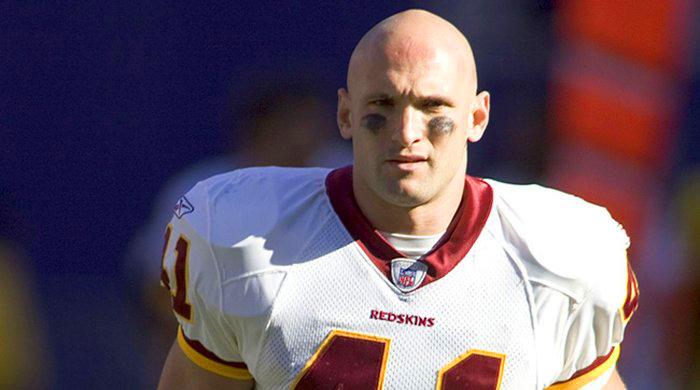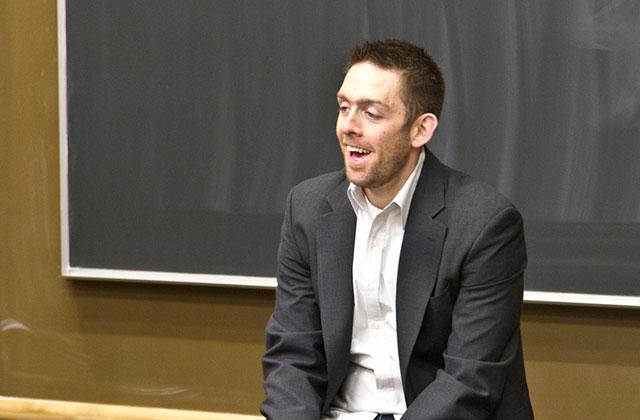
As Wayne Drehs paged through the Dallas Morning News sports page, a featured high-school football player caught his eye. Overstreet. There was something familiar about that name.
David Overstreet Jr. was the son of the late David Overstreet, a running back for the Oklahoma Sooners and Miami Dolphins who was killed in a car crash in 1984. The younger Overstreet had become one of the top players in Dallas, modeling his game after his father, whom he barely got the chance to meet.
Drehs pursued the lead and wrote a piece that his colleagues wouldn’t have caught without his knack for finding a meaningful sports story. That story got him in the door at ESPN in 2000, less than a year after graduation. He’s been there ever since.
Uncovering incredible stories buried in the world of sports has defined Drehs’ career. Since he started at ESPN, his work has been awarded numerous Emmys and transcended the reach of traditional sports writing.
“Early on at ESPN, an older friend of mine said to me ‘You’re good at this, you can do this, but you need to pick a beat and figure out what you want to write about,’ ” Drehs said. “I never did that, I never picked a beat. I just jump around and tell great stories, and that has worked out.”
In 2006, Drehs followed a high-school football team in Alaska, portraying the difficulties of fielding opponents and battling through the total darkness that affects the state in late fall and winter.
His 2007 piece, “Ray of Hope,” examined the impact of Jason Ray, the man behind a University of North Carolina mascot. Ray, an organ donor, was killed in a car accident. “Ray of Hope” sought out all of the beneficiaries of Ray’s organ donations, and the piece encouraged thousands to sign up as organ donors.
All of those stories won Emmys.
Drehs’ journey as a sportswriter began when he chose the University of Iowa at 18 years old. After he visited, the choice was a no-brainer, he said.
When he arrived on campus, he visited The Daily Iowan, where he was told there were openings for the Sports and Metro sections. The sports editor at the time, Mike Triplett, interviewed Drehs and assigned him to cover cross-country. When Drehs protested his assigned beat, wishing instead to cover football, Triplett reminded him that he was a freshman.
The two ended up being in each other’s weddings years later and are now coworkers at ESPN.
When Drehs became DI sports editor, he hired Matt Bowen, then a safety on the football team and now another ESPN colleague.
“Wayne Drehs is one of the best writers you’ll ever read, period,” Bowen said. “It doesn’t get better than that.”
The lure of the DI Sports section in that era wasn’t just the group of writers. Iowa athletics was in a state of flux.
Drehs was there when Hayden Fry retired and Kirk Ferentz was introduced as the new head football coach. He was there for the change in basketball coaches — Tom Davis to Steve Alford. He was there when Dan Gable retired. All of this, Drehs said, made working at the DI especially exciting.
“I spent more time in that newsroom than any other building or any other place excluding my home, and even then, my home changed every year. I may have spent more time there than any place in Iowa City.”
Drehs even met his wife at the DI.
In 2013, he was named a UI Distinguished Alumnus for his work at ESPN.
“That place is incredibly special to me and it always will be,” Drehs said about the DI. “It laid the foundation for my success, not only as a journalist but as a person.”
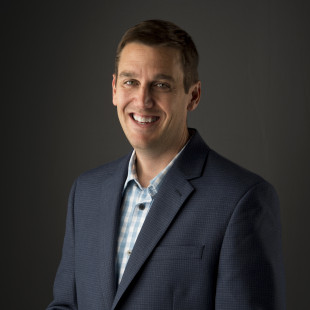
In the early summer days of 2005, Mike Triplett decided to commit to a budding relationship with the woman who became his wife. She was from the New Orleans area, and he landed a job with the Times-Picayune to cover the New Orleans Saints. The situation, at the time, seemed ideal. But just two months later, Hurricane Katrina hit.
Not only did the storm destroy the apartment Triplett and his wife were renting, it made him question and later reaffirm the profession he had decided on when picking a college more than a decade earlier.
Triplett covered the Saints from San Antonio for four months, away from his wife, who lived in New Orleans during the aftermath of Katrina.
“It was hard to feel sorry for ourselves when other people were going through much harder things than we were,” Triplett said. “Sports reporting in general is not always hard-hitting journalism. But as I visited shelters in San Antonio, people wanted normalcy and an escape in their lives, so what I was doing still felt important.”
As a Davenport native, Triplett had worked for the Quad-City Times during his high-school days. His college search was directed by a pamphlet that a guidance counselor had given to him, which listed the top-five journalism schools in the country.
“When I visited The Daily Iowan, I was blown away by the quality of the paper,” he said. “They offered me a spot in the fall, and I left Iowa knowing where I wanted to go. I knew I wanted to write for The Daily Iowan.”
Triplett started as a freshman on the volleyball beat, and by the second semester, he was the assistant sports editor. He spent the next couple of years as an editor, and one of his hirings was Wayne Drehs.
Sifting through the DI’s archives in search of Triplett’s work yields a plethora of nuanced, thought-provoking columns. That style was evident in college, in his postgraduate time at the Sacramento Bee covering the San Francisco 49ers, in the Times-Picayune, and now at ESPN.
Triplett has been covering the Saints since that dreadful summer that threw both the team and the entire city into a state of turmoil. He joined ESPN in 2013 during the company’s effort to hire a beat writer for every NFL team. In addition to writing, he regularly makes radio and television appearances across ESPN’s wide-ranging platform to talk about the Saints.
Modern technology allows Triplett to work from New Orleans, setting up his own cameras for SportsCenter segments 1,400 miles away from ESPN’s headquarters in Bristol, Connecticut. Twenty years earlier, Triplett was the first “webmaster” for the DI, a job that required compiling all of the articles from that day’s paper and posting them onto the emerging World Wide Web.
He was awarded the Bob Roesler Media Award in 2014. His best career accomplishment, however, may be the stamp of approval he received from Nick Saban during his time covering LSU at the Times-Picayune.
“Sometimes, he would yell at a reporter, but hey, that was usually his best quote,” Triplett said. “I think he respected me because I had covered a NFL team.”
As decorated as Triplett’s career has been, he says some of his best memories still come from his days with the DI.
“After an away game at Ohio State, all of us who were there covering it made a commitment to getting back to Iowa City before the bars closed,” Triplett said. “I still don’t think I’ve faced a deadline pressure that meant more to me than that.”
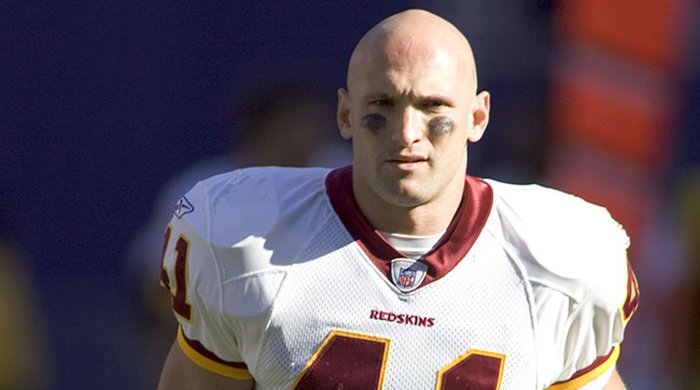
Matt Bowen sat on his family-room couch awaiting a phone call. His NFL career was over, his last game check cashed. His hands shaking, he answered the phone, praying his vocals would respond to the brain signals screaming, “TALK.”
It was Bowen’s first appearance on 670 The Score, the Chicago sports-radio station that so many Chicagoans such as him had grown up listening to. He had been invited on after contributing to the Chicago Tribune as an NFL writer after his seven-year NFL career had come to a close.
It wasn’t the first time that Bowen was nearly paralyzed by nerves on his first day at a new job. Almost a decade earlier, he lined up for the St. Louis Rams across from Troy Aikman and the Dallas Cowboys at Texas Stadium for his first NFL start. Just like in his 670 The Score début, he eventually regained his wits — or so he thought.
“It took me about four or five plays to say to myself, ‘It’s just football, just play football,’ ” Bowen said. “The running back ran to the sideline, and I hit him as hard as I could. I launched him. The only problem was he was about 5 yards out of bounds when I hit him.”
Bowen’s life since college had been full of contradictions; he threw his body around violently on Sundays but would find time during the week to write poetry for his wife. At Iowa, he played safety at an All-Big Ten level on Saturdays and then wrote eloquently about it in the DI for Monday’s paper in 1998 and 1999.
“The Daily Iowan helped me a ton. To have that experience out of college helped me tremendously,” Bowen said. “It was unique, because I think I gave kind of an inside view about football.”
When Iowa legend Hayden Fry retired as the head football coach, the DI had the luxury of offering a player’s perspective. Bowen, who graduated in 1999, played under both Fry and current head coach Kirk Ferentz.
Bowen, who majored in journalism, was determined to write professionally regardless of his future in football. Because of NCAA restrictions, Bowen worked as an unpaid employee for the DI and even covered the track and field team during the football offseason.
While in the NFL, Bowen continued to write. He was the 198th pick in the 2000 NFL Draft. The 199th pick was a guy named Tom Brady. In 2002, Bowen recorded his first interception in his NFL career. Brady, of course, threw the pass.
Every city he landed in, he reached out to the local newspaper and asked to contribute. With the St. Louis Rams (2000-2001), he wrote for the Post-Dispatch. In Green Bay, he wrote for the Milwaukee Journal Sentinel while playing for the Packers (2001-2002). In his final two stops with the Washington Redskins (2003-2005) and Buffalo Bills (2006), he wrote for the Washington Times and Niagra Gazette.
After the NFL, Bowen returned to the Chicagoland area. Still determined to be a full-time writer, he returned to school at DePaul University to pursue a M.A. in journalism.
Before arriving at ESPN, where he writes as a NFL Insider currently, Bowen wrote for the Chicago Tribune, the Chicago Sun-Times, and the National Football Post.
Bowen’s career path is an anomaly. Unlike many former athletes in media who have gained credibility strictly through their former careers, Bowen was always as much of a journalist as he was a football player.
“The coolest thing about Iowa City for me back then was seeing everyone going to grab the DI in the morning,” Bowen said. “To have your byline in there, it was pretty special.”
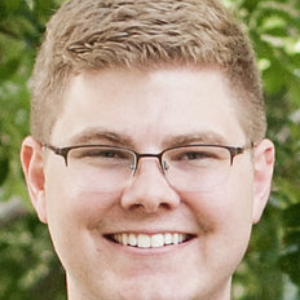
Imagine having a job at the top company in your respective professional industry. Also, imagine having a decision-making role at that company. Now, imagine leaving your role at that company on your own accord.
That’s what Scott Miller did last October when he left ESPN, where he had been since 2011, for a job at a startup company in New York, The Action Network.
His jobs at ESPN included senior researcher and assistant editor for ESPN The Magazine. He then worked as an associate editor, general editor, and senior editor for ESPN.com.
Miller left ESPN in the rear view to become the deputy editor at The Action Network, a sports content creation company that was launched in the last year.
“For me to leave, it had to be pretty much a perfect situation,” Miller said. “It was the right time in my life and my career to take a little bit of a swing, go work in a subject matter I really like and see how it all pans out.”
The Action Network is composed of a website and app that assists, as Miller put it, “fans who have a stake in the game.” The network bends toward a gambling and fantasy perspective for “the fantasy generation,” Miller said.
The advent of The Action Network comes at a time when sports gambling is shedding some of its negative stigma. The Supreme Court will soon hear a New Jersey sports-betting case, ruling on whether more than just a few states can allow legalized sports betting.
“I think people are sort of realizing that if someone can drink, they should probably be able to gamble on sports,” Miller said. “Obviously, both can be abused, but adults are adults, and you put the trust in people that they can handle it.”
Miller’s editing roles started in college, where he served as the editor of the DI Pregame, the extensive weekly preview before football game days in the fall.
The DI’s reputation lured Miller to the University of Iowa in the first place. He picked Iowa out of high school based on research of the top student newspapers in the nation.
He covered the football team during its Orange Bowl run in 2009.
“It was cool to be a part of that,” Milller said. “Part of the reason why I loved Pregame was the ability to write cool, longer stories and kind of humanize the people involved in the game.”
During his time at the UI, he also contributed to other publications and projects outside of the DI. He interned for ESPN and the Washington Times and also worked as an unpaid researcher for author Bob Smiley. Smiley was writing a book on Tiger Woods in 2008 (Follow the Roar), and Miller, a golf fan, reached out to him to see if he needed help.
“Sometimes, you have to be willing to show people what you’ve got for cheap or for free, unfortunately,” Miller said. “The fact that they found a way to pay us something at The Daily Iowan was incredible to me.



